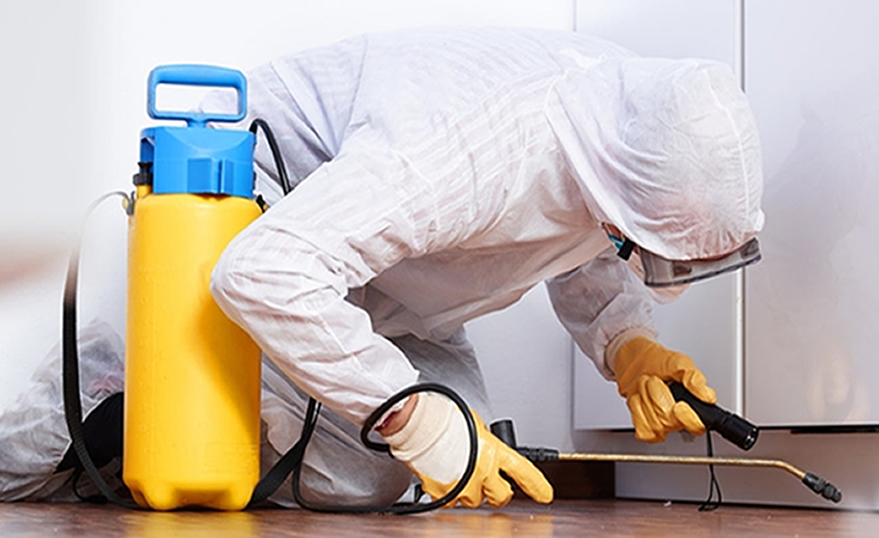Comprehensive Pest Control Services: Maintain Your Residential Or Commercial Property Pest-Free!
Comprehensive Pest Control Services: Maintain Your Residential Or Commercial Property Pest-Free!
Blog Article
Expert Insect Control Techniques for Long-Term Outcomes
Professional parasite control techniques envelop a comprehensive approach that begins with an extensive assessment and assessment, adhered to by specific bug recognition to recognize their behavior patterns. The application of Integrated Insect Administration (IPM) concepts, coupled with eco-conscious therapies, forms the cornerstone of sustainable parasite removal.
Inspection and Assessment
Upon entering a residential or commercial property for insect control services, the preliminary step is an extensive inspection and evaluation to identify the degree of the infestation and figure out one of the most effective treatment strategy. Professional pest control technicians are educated to thoroughly examine the properties, seeking indicators of insect task such as droppings, chomp marks, nests, or any kind of architectural damage. They will additionally assess the conditions that may be drawing in insects, such as food sources, water leakages, or entrance points.

Bug Recognition and Habits

Moreover, understanding the behavior of the recognized parasite is crucial to carrying out effective control steps. For instance, recognizing where parasites nest, what they prey on, and their task patterns can assist pest control professionals devise strategies to remove them effectively. Some pests might be nocturnal, while others are extra active throughout the day. This expertise allows for the application of therapies at ideal times for optimum efficiency.
Integrated Pest Monitoring (IPM)
Integrated Pest Administration (IPM) methods integrate multiple techniques to regulate and avoid bug infestations in a sustainable and eco friendly way. exterminator. By incorporating methods such as organic control, environment adjustment, modification of social practices, and the use of immune selections, IPM aims to decrease the usage of chemical pesticides
Among the crucial principles of IPM is the emphasis on avoidance. This aggressive strategy includes surveillance bug populations on a regular basis to spot any kind of prospective concerns prior to they escalate. By identifying insect issues beforehand, pest control measures can be executed quickly and effectively.
In addition, IPM promotes the usage of safe parasite control methods whenever possible. This can consist of using all-natural killers of the parasites, introducing valuable pests, or using pheromones to disrupt breeding patterns. By reducing dependence on chemical pesticides, IPM not just shields the setting however likewise assists maintain a balance in the community.
Environmentally-Friendly Treatments
Carrying out eco-conscious techniques in insect control procedures can effectively address problems while focusing on ecological sustainability. Environmentally-friendly treatments concentrate on lessening the effect of continue reading this bug control techniques on environments, non-target organisms, and human health. These methods usually entail the use of natural killers, such as ladybugs or nematodes, to manage pest populations, lowering the requirement for chemical treatments. In addition, methods like habitat adjustment, such as adjusting Learn More dampness levels or removing food resources, can help prevent insects without the usage of dangerous substances.
One more key element of environmentally-friendly treatments is the usage of organic and naturally degradable products that break down quickly without leaving harmful residues in the setting. Botanical pesticides acquired from plants like chrysanthemums or neem provide effective bug control while posing very little danger to non-target species. Employing methods like heat therapies or scent traps can target specific insects with precision, minimizing the total environmental impact of insect control methods.
Recurring Surveillance and Upkeep
Routine assessments by skilled experts are required to recognize any type of indications of insect task, assess the effectiveness of previous treatments, and make modifications to the insect control strategy as needed. By keeping track of pest populations over time, insect control experts can track trends, prepare for potential problems, and apply preventative measures to reduce the risk of future invasions.
In addition to tracking, upkeep methods are vital for long-lasting insect control success. This includes applying proper sanitation steps to get rid of potential food and water resources for parasites, sealing off entry indicate avoid pests from getting in the facilities, and attending to any structural issues that can facilitate insect infestations (bed bug treatment). By integrating recurring surveillance and house pest extermination upkeep right into an integrated bug management strategy, services can make sure a pest-free setting and secure their residential or commercial property against pricey damage and health dangers
Verdict
In conclusion, utilizing professional parasite control strategies such as thorough examination and assessment, accurate pest identification and understanding of their habits, integrated pest monitoring strategies, environmentally-friendly treatments, and recurring surveillance and upkeep are crucial for attaining long-term lead to bug control. By carrying out these methods, people can successfully handle parasite problems and maintain a pest-free atmosphere in a lasting manner.
Report this page